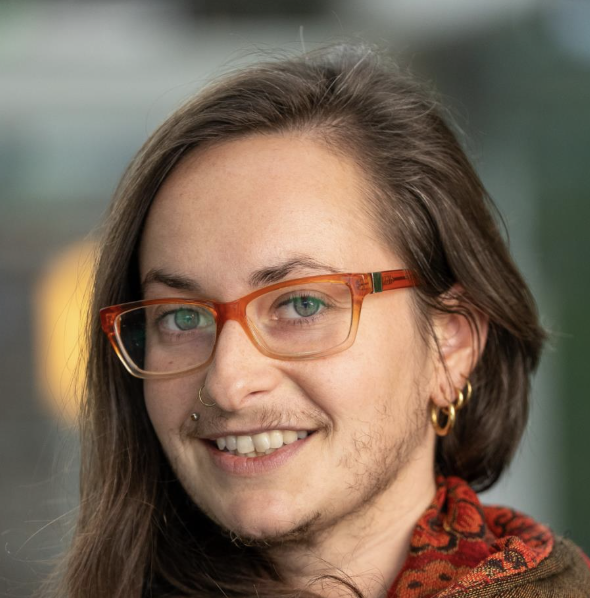Book your place
To book a place please email events@imroc.org with “Lived experience research” in the subject line.
Join us for an open and reflective conversation exploring altered states of consciousness beyond the boundaries of psychiatric language. Together, we’ll look at what happens when experiences often labelled as psychosis or schizophrenia are reimagined as meaningful - even transformative - aspects of human experience.
Drawing on their respective research, Katie and Sabina will share insights into how we can expand our collective understanding through dialogue, creativity, and peer support. This webinar offers a space for deep listening, shared reflection, and the co-creation of new ways to relate to extraordinary experiences.
Participants can expect to:
Hear brief presentations from Katie and Sabina on their respective lived experience catalysed research into transformative and non-pathologising understandings of altered states.
Take part in a facilitated group discussion exploring what these findings mean for us as practitioners, peers, and human beings.
Reflect together on how peer support spaces can offer compassionate, co-created alternatives to dominant psychiatric narratives.
Share insights, questions, and lived experiences (as much or as little as feels comfortable) in a respectful, non-judgmental space.
(Please note: we may use small breakout groups to encourage deeper discussion and connection prompts will be provided to guide reflection.)
Benefits of Attending
Together we will explore some of the following, according to the direction of group discussion:
Explore the role of lived experience researchers, and the unique benefits lived experience research brings.
Reflect on how new narratives can be co-produced through shared inquiry and lived experience.
Explore the alternative ways of finding meaning in our lived experiences, moving beyond clinical or diagnostic interpretations toward personal and collective understanding.
Consider the potential of peer support groups as spaces for mutual exploration, creativity, and belonging.
Discuss the limits of sense-making: what happens when words fall short, and how we might honour the mystery or symbolism within altered states.
Experiment with alternative forms of meaning, such as metaphor, imagery, and spirituality, as bridges to deeper understanding.
Leave with fresh perspectives and practical inspiration for how to hold space for these experiences within our own lives and communities.
Presenters
Dr Sabina Wantoch
Sabina Wantoch is a Consultant with Imroc’s peer training team for the Peer Support Work in Mental Health training. They are also a lived experience researcher; they completed their PhD on anomalous experiences and the effect of social contexts and framings on these experiences, and the potential of peer support groups as alternative contexts. They have published papers for special issues of the International Mad Studies Journal and Frontiers in Psychology. They were an invited speaker at The University of Oxford conference: ‘From Philosophy of m/Madness to m/Mad Philosophy’. Community is integral to their research practice, which is informed by their own experiences as well as, and with, the communities they are part of. They are a long-term volunteer for PsyCare UK, supporting people through altered states at events on the ground, and during the integration phase. They have a background in facilitating peer support groups and are deeply passionate about the power of the group space. They are also a multidisciplinary artist, exploring animism, queerness, mythos and trauma, through poetry, theatre, and sound. Their relationship with anomalous experience and spirituality deeply informs their research and art practice, and vice versa.
Katie Mottram
Katie Mottram is a Consultant with Imroc’s Research, Evaluations, Publications and Development team and leading on a pilot project ‘Tending Distress’, which aims to bring somatic practice into clinical settings to support mental health workers with their own nervous system regulation. Having worked in various mental health settings over the last 25 years, she has long been a vocal advocate for reimagining mental health crises as opportunities for transformation. In 2017, inspired by her own lived experience of suicidality and subsequent personal transformation, Katie founded the international campaign 'Emerging Proud.' This initiative amplifies stories of individuals who view their crises as catalysts for growth. Her 2024 heuristic research, Is There Meaning in Madness?, aims to bring transpersonal approaches into mainstream mental health care, seeking to liberate individuals from pathologisation and usher in a more holistic, human-centered approach to healing.
Katie is currently also part of the Community Research Team for an NIHR funded study on 'Exploring the Soteria approach as an alternative to psychiatric inpatient treatment in the UK'.
Emma Watson - Chair
Emma Watson is the programme lead at Imroc for Research, Evaluation, Publications and Development, and was the Peer Support Lead at Nottinghamshire Healthcare NHS Foundation Trust. As Peer Support Lead, she led the strategic introduction of peer support workers into a range of clinical services, establishing training and supervision processes to support this development. Prior to this, Emma worked in a number of peer roles, including peer support worker, peer supervisor, peer trainer and peer researcher. Emma was among the first peer workers to be employed in Nottingham NHS Trust in 2010; an experience which transformed her own recovery, as well as her understanding of the power of lived experience.
As a programme lead at Imroc, Emma aspires to centre lived experience perspectives in research and publications, and offer accessible, creative ways for knowledge to be developed and shared. She is leading on the development of an MSc in Lived Experience Leadership as well as overseeing Imroc’s research and evaluation projects. Emma's commitment to advancing peer support is further demonstrated through her extensive research publications. She has authored numerous articles, as well as co-authoring the book "Peer Support in Mental Health," which provides an in-depth exploration of peer support concepts and practices. Her PhD explored peer support in the context of an NHS service, especially how this context changes or constrains peer support, and how individual peer workers resist this process.



